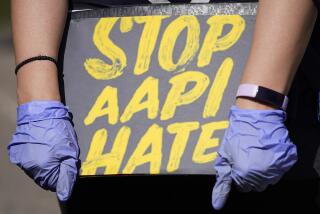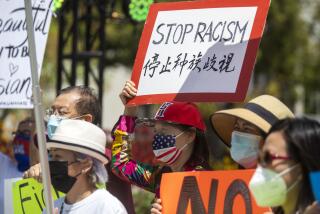A new generation hopes to turn activism to fight Asian hate into a sustained movement
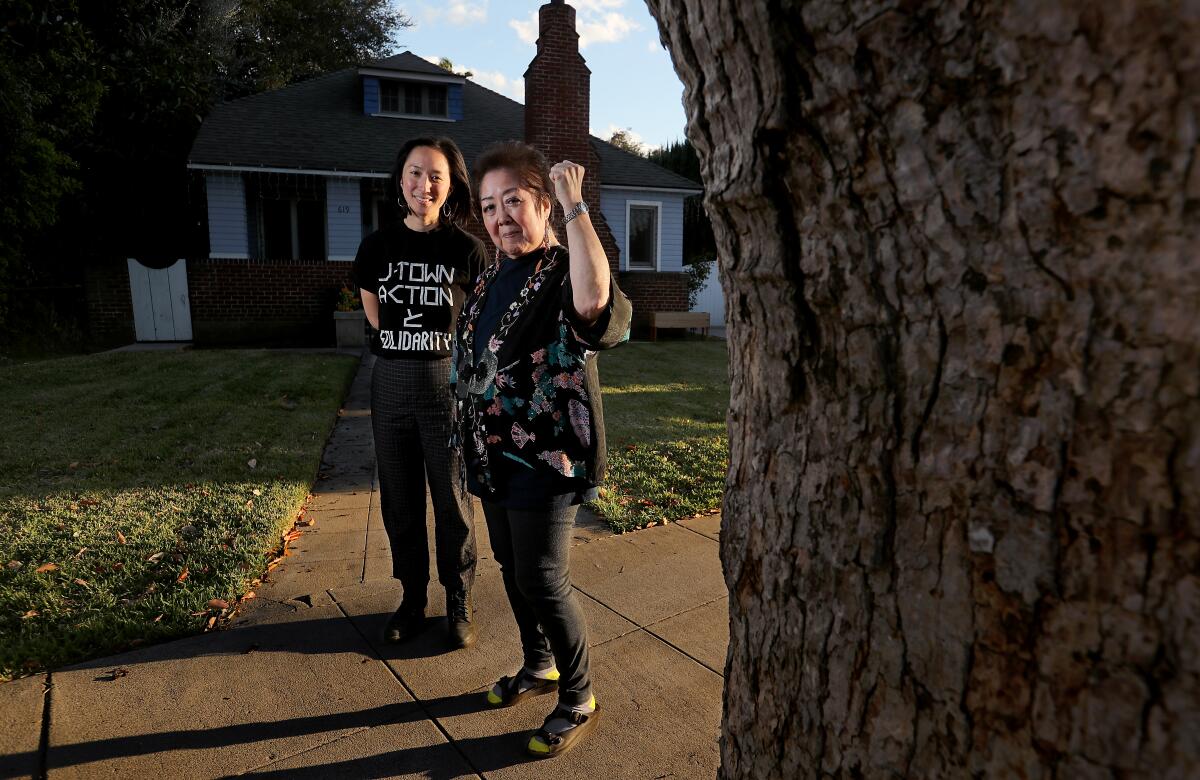
- Share via
Miya Iwataki was a college student in the mid-1960s when she stumbled onto a meeting of the Brown Berets in a South Los Angeles bar that set her on a lifelong mission of activism. She dropped out of school to work for the United Farm Workers and later helped secure reparations for Japanese Americans imprisoned in internment camps during World War II.
She realized Asian Americans shared many of the same struggles as Black and Latino people and could use those activist movements as models to create a powerful one of their own. Even though Asian activism has claimed important victories over the years, it has at times seemed largely episodic, struggling to gain the same critical mass.
Now, a new generation is fighting to blow up the myth of the “model minority,” condemn anti-Asian racism and create a sustained movement to end more than a century and a half of bigotry and marginalization.
The Black Lives Matter protests last summer inspired many young Asian Americans to coalesce in this effort, as did a surge of anti-Asian hate fueled by then-President Trump and his supporters calling the coronavirus “the China virus.” The shooting deaths of six Asian women in the Atlanta area last week, after which a 21-year-old white man has been charged, hardened their resolve, while bringing fresh, national outrage to this enduring blight.
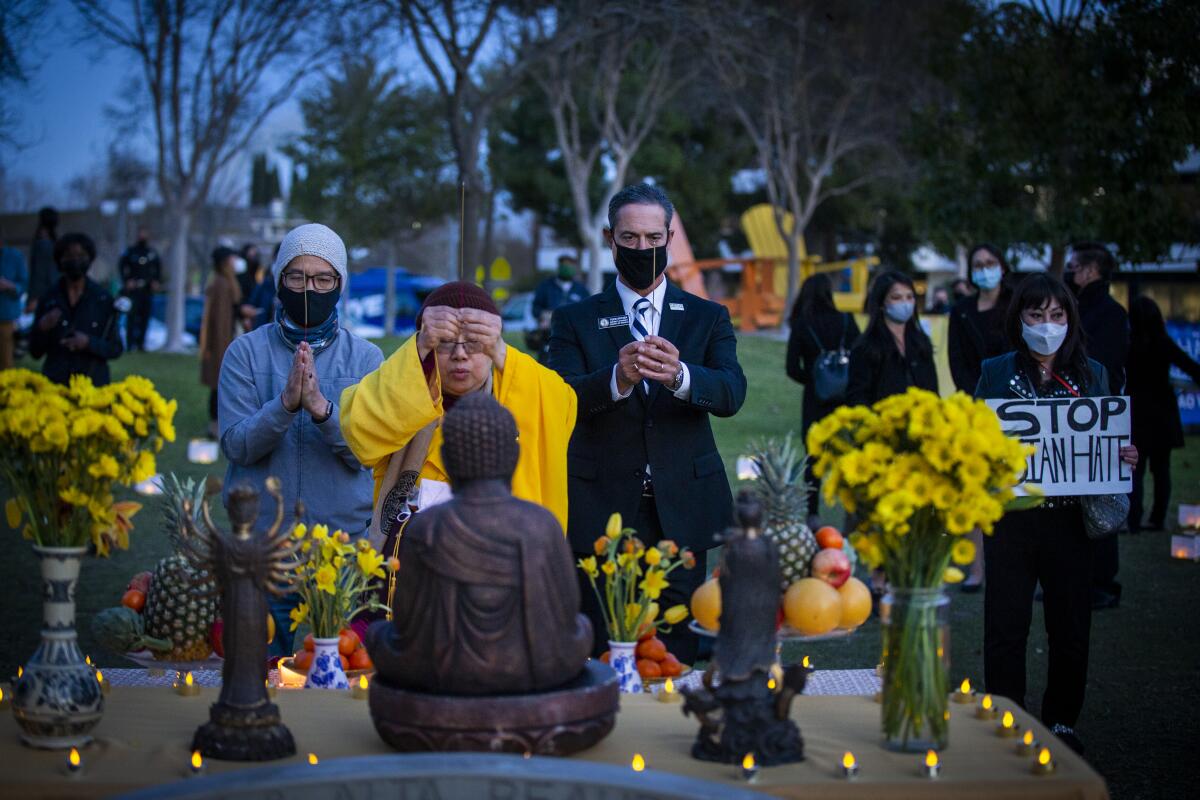
Iwataki’s niece, Ana, is on the front lines now, an organizer for J-Town Action & Solidarity, building upon past movements and working with other groups such as We the Unhoused and Ktown for Black Lives for the broader goal of uprooting a system of white supremacy.
“There are intergenerational organizations we’re able to learn from, people like my aunt,” said Ana Iwataki, 32. “[Younger generations] also share our perspectives as conversations evolve and we have more language to recognize all aspects of white supremacy we have been fighting against for so long.”
Edward Chang, a Korean American professor of ethnic studies at UC Riverside, said that some of the impediments to building a larger movement are linguistic diversity within the community, as well as the “model minority” stereotype, which makes Asian Americans seem like a “problem free group.”
But he said the surge of hate incidents and a heightened national awareness of racism, after Minneapolis police killed George Floyd as bystanders begged them to stop, have helped give the current activism momentum.
“We are also victims of racial hatred — we have to make that visible — not only visible but turn that into activism. We have to report cases [of hate incidents] and we have to fight back, and we have to demand representation, as well as justice.
Ellen Wu, the director of the Asian American studies program at Indiana University Bloomington, called the current movement against anti-Asian violence unprecedented.
“It’s actually really unexpected to start to see expressions of solidarity from individuals, organizations or groups that are not centered on Asian Americans,” she said. “I never in my wildest dreams could have imagined a critical mass of national attention on Asian American history.”
The support coming from non-Asian groups, Wu said, reminds her of the George Floyd movement last summer, which mobilized people from all races who had not previously been actively involved in racial justice issues.
Wu said that it’s important to recognize that the grass-roots campaign against anti-Asian violence follows other moments in history when Asian American activism made national headlines.
She pointed to how the term “Asian American” emerged out of the Asian American movement, which began in the late 1960s and called for solidarity across Asian nationalities and other minority groups. Wu said it grew out of the Black Power and anti-Vietnam War movement, and many say it began with a strike in 1968 at San Francisco State College, where Asians alongside students from other racial groups pushed for an ethnic studies curriculum.
“Those folks pushed policymakers to begin to recognize Asian Americans as a minority group that deserved new resources and attention being made available to minority groups as a result of the civil rights movement,” Wu said.
There were plenty other episodes of Asian American activism.
Filipinos launched the Delano Grape Strike in 1965 to protest the exploitation of farmworkers. Asian Americans mobilized after the 1982 killing of Vincent Chin, a Chinese American beaten to death in Detroit by two white unemployed autoworkers who had misidentified him as Japanese and blamed him for the decline of the U.S. auto industry. The Japanese Americans fought for and won their reparations.
Hong Lee, 35, turned to activism after an incident in August at a restaurant in the Pico-Union area of Los Angeles, when a man approached her and asked her out to lunch. Lee declined, saying she was married. He began screaming at her to “go back to Asia.”
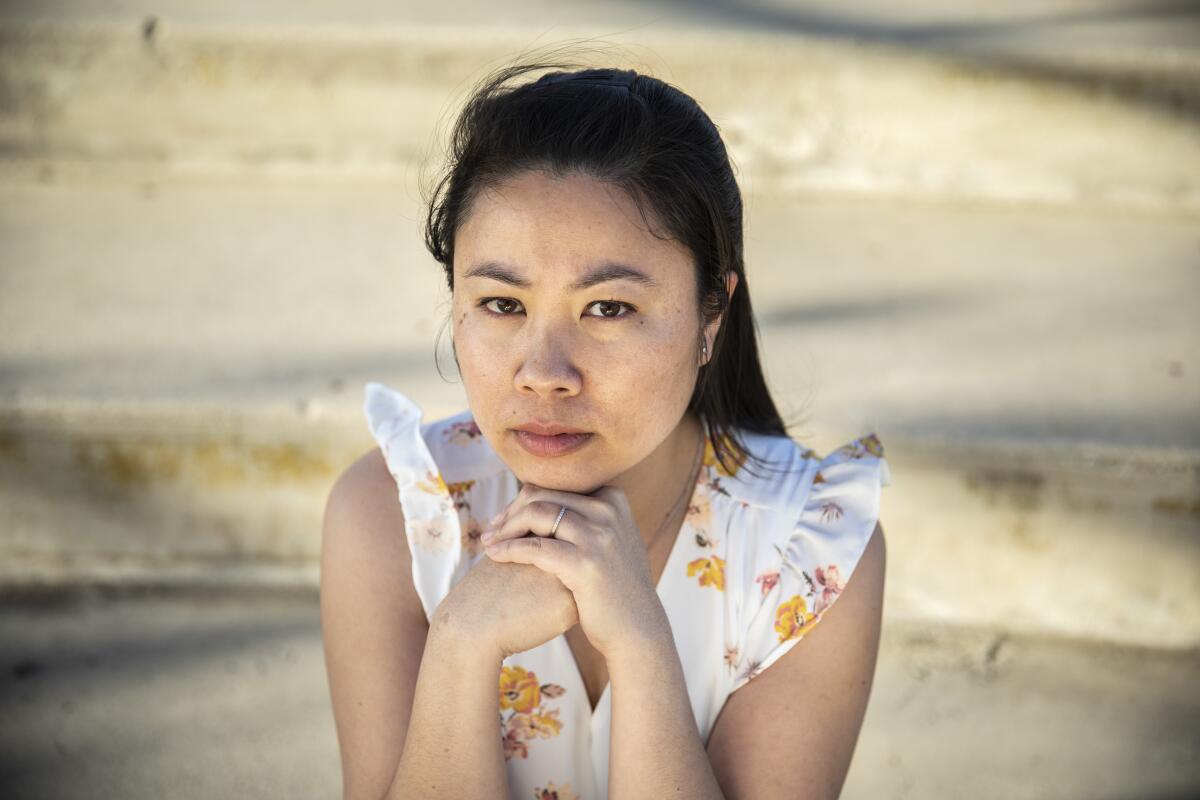
After posting a video of the encounter, she heard from five other women who said they had been harassed by the same man.
In the months since, she’s attended multiple rallies against Asian violence and shared her story at a vigil for the Georgia shootings in the San Gabriel Valley last weekend. An elderly Chinese woman there disclosed to Lee a similar incident she had experienced and asked to stay in touch.
“It brought me a lot of hope that although there is such a horrific incident that occurred, our community is coming together and uniting in a way that I have never ever seen in our lifetime,” Lee said.
Young-Jin Yang, a 34-year-old Downey resident, was upset last month that the rise in anti-Asian violence was not getting attention. He uploaded a video on Instagram about Vicha Ratanapakdee, an 84-year-old Thai American who died after an assailant violently shoved him to the ground in January.
“It really hits hard for me personally just because of the fact that that could have been my grandparent walking down the street,” he said in the video. “They’re getting attacked merely because of the way they look.”
He shared how he hated his name growing up and would get into fights because of the way he looked.
“If you don’t stand up, if you don’t say anything, you are normalizing the situation,” he told viewers. The video got more than 11,600 views.
Since then, Yang has attended anti-Asian hate rallies — flying to one in New York several weeks ago — and volunteers at street patrols in Chinatown and Koreatown to protect Asian American residents from attacks.
While he’s grateful that anti-Asian violence has made national headlines, he’s frustrated that it took a mass shooting to elevate the issue.
“It’s better than before, it’s getting more coverage, but we still have a huge problem ahead of us,” he said.
Renee Tajima-Peña, a filmmaker whose landmark docuseries “Asian Americans” aired on PBS last year, credits the younger generation for mobilizing online using “the infrastructure already in place from decades and decades and decades of work done by the elders in community building.
“The people before who were student activists in the ’70s and ’80s carved spaces for Asian civil rights to get to the spotlight and you can see how they inspired the youths to act.”
She points to the outrage last week not just of the shooting in Georgia but the Cherokee County Sheriff‘s Office spokesman attributing it to the shooter having a “really bad day.”
“The reaction from the Asian youth voice was just breathtaking and swift,” she said. “That kind of activism has been ramping up, based on the path of the trailblazers. More than that, people are really hungry to understand our history so they know better how not to repeat it.”
Research has shown that people tend to drop out of movement work when they feel they’re not making a difference, activists say, so to sustain modern-day missions, one must have a combination of digital smarts matched to individual talent.
“We’re sitting in the middle of a pandemic. People are worried, people are depressed so you have to recognize even the small victories that are made possible by any amount of teamwork,” Lacy Lew Nguyen Wright said.
Wright co-planned the “Love Our Communities: Build Collective Power” rally in early March in Little Tokyo, an event that drew as many as 1,500 participants to the steps outside the Japanese American National Museum.
The event was especially symbolic, happening days after a fire and vandalism partially destroyed the nearby Higashi Honganji Buddhist temple. The incident is under investigation.
“Not every win is huge. Not every single win is a legislative win. Not every single win is getting a demand out of the mayor,” she added. “Rallies are to show the world your power in numbers. Then you do the work behind the scenes.”
More to Read
Sign up for Essential California
The most important California stories and recommendations in your inbox every morning.
You may occasionally receive promotional content from the Los Angeles Times.

